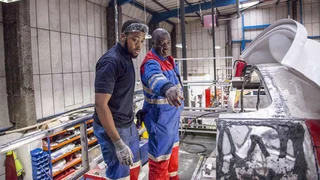
Apprenticeships are revolutionising the way individuals acquire skills and gain practical experience in the UK.
According to recent data from the UK government, there were 740,400 people participating in an apprenticeship in England in 2021/22. Apprenticeships have been proven to lead to higher employability rates and even increased earning potential.
If you are curious about apprenticeships and how they can solve the dilemma of gaining experience without sacrificing education, you’re in the right place! We’ll unravel the mysteries of apprenticeships and provide you with a clear understanding of how they work.
Whether you're a student considering your career path or an employer exploring talent development options, this guide will equip you with the essential knowledge to navigate the world of apprenticeships.
Let's dive in!
What is an apprenticeship?
An apprenticeship is a method of studying for a recognised qualification while earning a wage and gaining experience. Apprenticeships offer professional training and on-the-job learning in a range of sectors, including engineering, customer service, and pharmacy.
Apprenticeships are for everyone aged 16 or over, whether you’re already working or are looking to start a career in a chosen industry. In fact, apprenticeships for over 25s are becoming increasingly common for those wanting to change careers.
There are different levels of apprenticeships, all with an equivalent educational level:
- Level 2 Apprenticeships (GCSE)
- Level 3 Apprenticeships (A-Level)
- Level 4 and 5 Apprenticeships (Foundation degree and above)
- Level 6 and 7 Apprenticeships (Bachelor’s or Master’s degree)
What will you learn on an apprenticeship?
An apprenticeship offers comprehensive support and learning opportunities tailored to your needs. Throughout your employment, you'll receive personalised guidance through a combination of practical experience and one-on-one sessions with a dedicated training adviser. This hands-on approach ensures you gain real-life expertise, foster essential teamwork abilities, and unlock pathways for career progression.
By immersing yourself in the industry, you have the unique advantage of shaping your own professional trajectory while acquiring valuable skills and industry-recognised qualifications. With an approved study program aligned with your job, you'll be equipped with the expertise, experience, and credentials sought after by potential employers. Additionally, you'll earn a competitive wage as you embark on this enriching educational journey.
How long is an apprenticeship?
An apprenticeship can take between one and five years to complete depending on the sector and level. An apprentice typically works between 30 and 40 hours a week, including training and time spent at college. Some businesses offer part-time apprenticeships in special circumstances, but these must be a minimum of 16 hours a week.
The full-time schedule of an apprenticeship means you get a better understanding of the sector and business and allows for further progression, such as taking on more complex tasks due to your experience within the role.
How much do you get paid as an apprentice?
An apprenticeship combines learning with earning. An apprentice’s salary is affected by different factors:
- The apprenticeship level and sector
- The apprentice’s age, experience, and qualifications
There is a minimum wage in place for all young apprentices. The minimum wage varies by age and how long the individual has been doing the apprenticeship. Those aged 19+ who have completed at least one year of their apprenticeship will earn at least the national minimum wage for their age. 16-18 year olds, or 19 year olds with less than one years’ experience will earn at least £5.28 an hour.
This is the minimum apprentices can be paid, however, employers can choose to pay more than the national minimum wage. This wage guide excludes any deductibles such as tax or national insurance which apprentices may need to pay.
How do you get an apprenticeship?
When it comes to securing an apprenticeship, Total People is here to guide you every step of the way. With our straightforward apprenticeship paths, we make it easier than ever to find the perfect opportunity that aligns with your career goals.
From engineering to healthcare, construction to business, our diverse selection of apprenticeship programmes caters to various industries.
Explore the exciting options available and discover how Total People can help kickstart your journey towards a successful and fulfilling apprenticeship.
What are the benefits of completing an apprenticeship?
There are numerous benefits of starting an apprenticeship.
- Earn while you learn- You’ll earn money and valuable work experience while working towards gaining a nationally recognised qualification
- Gain qualifications- You’ll gain on-the-job training and supportive study while you work
- The benefits of full-time work- This includes paid sick leave, at least 20 days of paid holiday, and statutory maternity or paternity pay and leave
- Workplace pension- You’ll automatically be enrolled in a workplace pension as long as you meet the pension eligibility criteria.
- No debt -Unlike a university degree, there’s no debt with an apprenticeship but you can work towards degree-level qualifications
- NUS Apprentice Card -Since an apprenticeship is still a study programme, you’ll gain the same perks and discounts available to other students. An NUS Apprentice extra discount card will offer apprentices many of the same discounts and benefits.
Apprenticeships are a strong solution to help you break into the industry. Find out more about how an apprenticeship can help you and your career by calling our expert team on 0333 920 3621.

Our Apprenticeship Paths
Total People offer apprenticeships in a variety of different industries.
Explore

